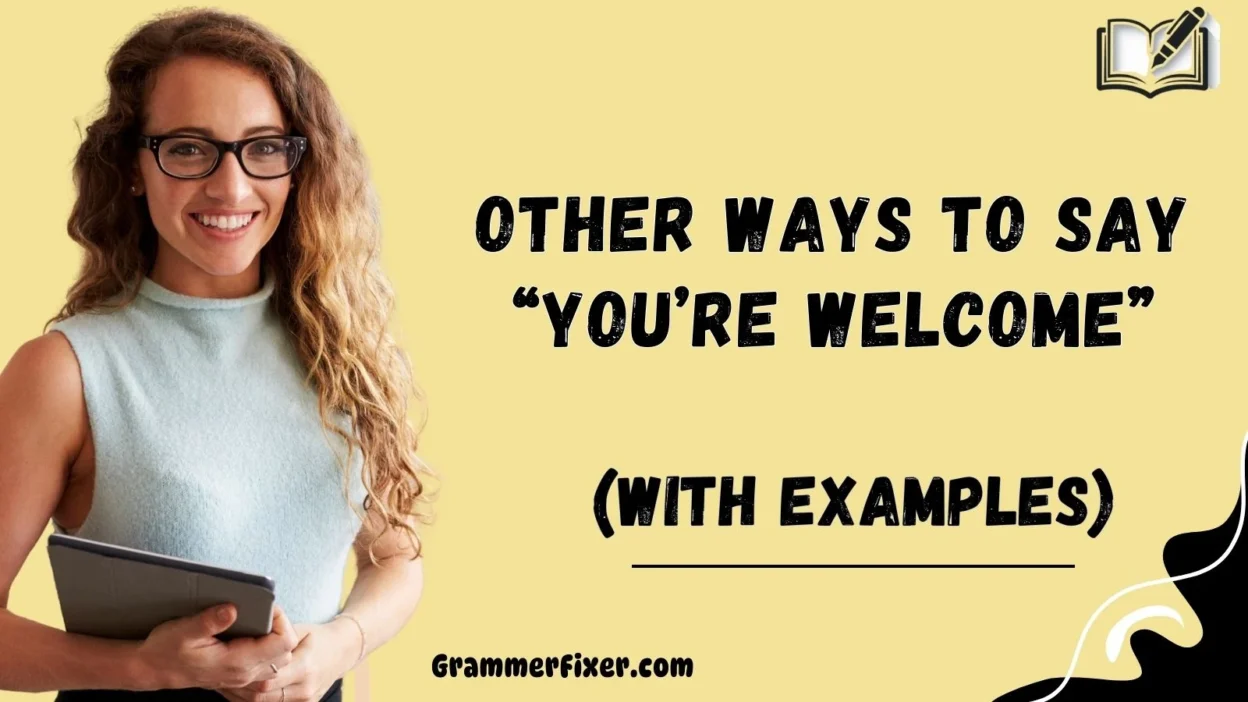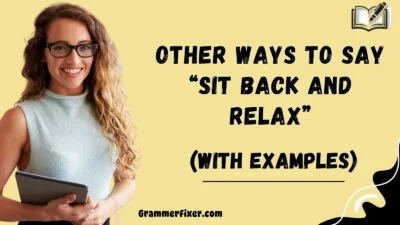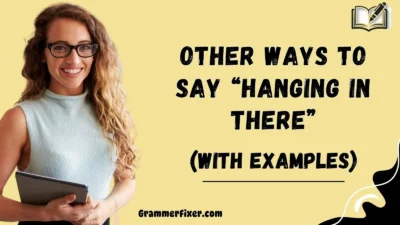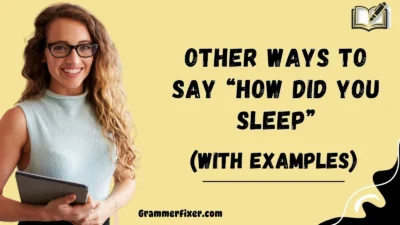Sometimes the simplest words—like “You’re welcome”—carry more weight than we realize. They aren’t just a polite reflex; they’re a way of showing warmth, care, and acknowledgement when someone thanks you. But in many situations, finding the right words makes the moment feel more personal, genuine, and meaningful. Whether you’re speaking with a friend, coworker, client, or family member, having alternatives to “You’re welcome” can help you communicate confidently and with the right tone.
Below, we’ll explore 30 thoughtful alternatives, along with their meanings, best uses, and real-life examples—so you can respond in ways that feel natural, professional, or heartfelt.
What Does “You’re Welcome” Mean?
The phrase “You’re welcome” is a common response to gratitude. It acknowledges that someone has said “thank you” and reassures them that their thanks is accepted warmly.
- Meaning: Acknowledging appreciation with politeness.
- Use: Everyday settings—formal, casual, professional, or personal.
- Tone: Polite, neutral, warm.
When to Use “You’re Welcome”?
You use it whenever someone thanks you for a favor, gift, gesture, or help. Whether at the workplace, in a restaurant, or at home with family, “You’re welcome” is universally recognized.
Is It Professional/Polite to Say “You’re Welcome”?
Yes. It is both professional and polite. In fact, it’s one of the most acceptable responses in both academic settings and business communication.
- Professional Use: Responding to colleagues, managers, clients, or customers.
- Casual Use: Talking with friends, family, or even a stranger.
- Best Practice: You can always rely on it when unsure—it’s a safe option.
Pros or Cons of Saying “You’re Welcome”
Pros:
- Universally understood.
- Works in all contexts (formal and casual).
- Shows warmth, humility, and politeness.
Cons:
- Can sound repetitive if used too often.
- May feel a bit stale or robotic in casual, modern conversations.
1. My Pleasure
Meaning: It brought me joy to help.
Detailed Explanation: Expresses genuine happiness in providing assistance.
Scenario Example:
- Person A: “Thanks for proofreading my essay.”
- Person B: “My pleasure.”
Best Use: Professional settings, polite conversations.
Worst Use: Rare in very informal, slang-heavy chats.
Tone: Warm, polished, professional.
2. No Problem
Meaning: Helping you wasn’t a burden.
Detailed Explanation: Downplays the effort, making it sound casual and friendly.
Scenario Example:
- Student: “Thanks for lending me your notes.”
- Friend: “No problem.”
Best Use: Casual conversations, friends, coworkers.
Worst Use: With formal clients—it may sound too laid-back.
Tone: Relaxed, approachable.
3. Anytime
Meaning: I’m always available to help.
Detailed Explanation: Suggests ongoing reliability and friendliness.
Scenario Example:
- Neighbor: “Thanks for watering my plants.”
- You: “Anytime!”
Best Use: Friends, family, neighbors.
Worst Use: Strictly professional interactions (e.g., law, finance).
Tone: Open, caring, informal.
4. Happy to Help
Meaning: I was genuinely glad to assist.
Detailed Explanation: Emphasizes positivity and willingness.
Scenario Example:
- Patient: “Thank you, Doctor, for explaining everything.”
- Doctor: “Happy to help.”
Best Use: Professional-client, customer service, caregiving.
Worst Use: Sarcastic contexts (could be misunderstood).
Tone: Enthusiastic, supportive.
5. Don’t Mention It
Meaning: What I did was small and not worth thanks.
Detailed Explanation: A modest phrase to downplay your effort.
Scenario Example:
- Friend: “Thanks for bringing snacks.”
- You: “Don’t mention it.”
Best Use: Friendly gatherings, casual chats.
Worst Use: Formal situations—it might seem too dismissive.
Tone: Casual, humble.
6. Of Course
Meaning: It was expected and natural to help.
Detailed Explanation: Implies that your support was obvious.
Scenario Example:
- Boss: “Thanks for finishing the report early.”
- Employee: “Of course.”
Best Use: Workplace, teamwork.
Worst Use: Might sound sarcastic if tone isn’t careful.
Tone: Supportive, straightforward.
7. Sure Thing
Meaning: Absolutely, I was glad to do it.
Detailed Explanation: A more casual, confident variation of “of course.”
Scenario Example:
- Friend: “Thanks for grabbing me a coffee.”
- You: “Sure thing!”
Best Use: Casual work chats, friendly settings.
Worst Use: Very formal writing or business events.
Tone: Relaxed, upbeat.
8. Absolutely
Meaning: Strong, emphatic yes to helping.
Detailed Explanation: Conveys enthusiasm and certainty.
Scenario Example:
- Guest: “Thank you for hosting.”
- Host: “Absolutely.”
Best Use: Social settings, warm responses.
Worst Use: Overly repetitive—it may lose effect.
Tone: Positive, confident.
9. You Bet
Meaning: Friendly assurance, like saying “of course.”
Detailed Explanation: Has a touch of enthusiasm and camaraderie.
Scenario Example:
- Friend: “Thanks for the ride.”
- You: “You bet!”
Best Use: Friends, close colleagues.
Worst Use: Formal, serious business.
Tone: Energetic, casual.
10. Certainly
Meaning: Formal way of saying “of course.”
Detailed Explanation: Conveys politeness and professionalism.
Scenario Example:
- Hotel Guest: “Thanks for the extra towels.”
- Concierge: “Certainly.”
Best Use: Hospitality, service, formal settings.
Worst Use: Casual banter—it may sound stiff.
Tone: Professional, polished.
11. Not a Problem
Meaning: It wasn’t any trouble at all.
Detailed Explanation: A casual phrase to show that the task or favor was easy and effortless for you.
Scenario Example:
- Teacher: “Thanks for staying late to finish the project.”
- Student: “Not a problem.”
Best Use: Casual workplace, friendly professional settings.
Worst Use: Very formal interactions (law, medicine, academia).
Tone: Relaxed, informal, helpful.
12. It Was Nothing
Meaning: Downplays your effort by making it seem insignificant.
Detailed Explanation: Shows humility and avoids making the other person feel they caused you trouble.
Scenario Example:
- Aunt Linda: “Thanks for helping me carry the groceries.”
- You: “It was nothing.”
Best Use: Friends, family, casual interactions.
Worst Use: Professional situations—it can sound dismissive.
Tone: Modest, humble, casual.
13. Glad I Could Help
Meaning: You feel satisfied that your assistance was useful.
Detailed Explanation: Highlights that you valued the opportunity to be supportive.
Scenario Example:
- Coworker: “Thanks for proofreading my report before the deadline.”
- You: “Glad I could help.”
Best Use: Workplace, school, teamwork environments.
Worst Use: Extremely formal, high-stakes interactions.
Tone: Positive, friendly, reliable.
14. It’s All Good
Meaning: Everything is fine; your help wasn’t inconvenient.
Detailed Explanation: Casual reassurance that there’s no need to feel indebted.
Scenario Example:
- Friend: “Thanks for letting me borrow your HDMI cable.”
- You: “It’s all good.”
Best Use: Informal settings with friends or peers.
Worst Use: Professional workplace—it may sound too laid-back.
Tone: Relaxed, informal, easygoing.
15. No Worries
Meaning: Don’t feel bad or apologetic for asking.
Detailed Explanation: A friendly phrase often used to make someone feel more comfortable and reassured.
Scenario Example:
- Neighbor: “Thanks for mowing my lawn while I was away.”
- You: “No worries!”
Best Use: Friends, neighbors, casual interactions.
Worst Use: Formal or academic settings.
Tone: Friendly, relaxed, informal.
16. I’m Here Anytime
Meaning: You’re always available to offer support.
Detailed Explanation: Communicates commitment and willingness to help again in the future.
Scenario Example:
- Friend: “Thanks for listening to me vent about my job.”
- You: “I’m here anytime.”
Best Use: Personal relationships, close friendships.
Worst Use: Business or professional meetings—it may sound overly personal.
Tone: Warm, supportive, empathetic.
17. Always Happy to Help
Meaning: Emphasizes consistent willingness and enthusiasm to assist.
Detailed Explanation: A stronger version of “happy to help,” highlighting a habitual kindness.
Scenario Example:
- Client: “Thank you for adjusting the schedule to fit us in.”
- Manager: “Always happy to help.”
Best Use: Workplace, customer service, leadership roles.
Worst Use: Overuse—it can sound insincere if repeated too often.
Tone: Warm, reassuring, professional.
18. Think Nothing of It
Meaning: Suggests the favor was too small to even acknowledge.
Detailed Explanation: An older phrase, still sometimes used to downplay your effort in a kind way.
Scenario Example:
- Friend: “Thanks for the ride, Lorena.”
- You: “Think nothing of it.”
Best Use: Friendly, slightly formal conversations.
Worst Use: Too dated in modern business communication.
Tone: Polite, humble, slightly old-fashioned.
19. No Big Deal
Meaning: Helping was minor and easy for you.
Detailed Explanation: Keeps the exchange light, casual, and informal.
Scenario Example:
- Carlos: “Thanks for hosting game night.”
- Friend: “No big deal.”
Best Use: Casual settings among friends.
Worst Use: Professional contexts—it can sound dismissive.
Tone: Informal, easygoing, modest.
20. It’s the Least I Could Do
Meaning: A modest way to say your effort was minimal compared to what they deserved.
Detailed Explanation: Often used when the other person has done something significant for you.
Scenario Example:
- Wife: “Thanks for making breakfast.”
- Husband: “It’s the least I could do.”
Best Use: Family, close friends, heartfelt conversations.
Worst Use: Casual, quick interactions—it may sound overly dramatic.
Tone: Humble, heartfelt, modest.
21. I’m Glad You Liked It
Meaning: Expresses happiness that the effort was appreciated.
Detailed Explanation: Goes beyond just acknowledging thanks—it emphasizes that you valued their joy in what you did.
Scenario Example:
- Guest: “Thanks for the delicious dinner, Rayna.”
- Host: “I’m glad you liked it.”
Best Use: Hosting, gifting, personal gestures.
Worst Use: Formal workplace—it may sound too personal.
Tone: Warm, appreciative, personal.
22. It Was My Honor
Meaning: Helping you was a privilege.
Detailed Explanation: A formal, respectful phrase that conveys deep appreciation for being included.
Scenario Example:
- Student: “Thanks for writing me a recommendation letter.”
- Teacher: “It was my honor.”
Best Use: Ceremonial events, formal acknowledgments.
Worst Use: Everyday casual interactions.
Tone: Respectful, formal, heartfelt.
23. Don’t Worry About It
Meaning: No need to feel like you’ve inconvenienced me.
Detailed Explanation: A relaxed reassurance that emphasizes ease and comfort.
Scenario Example:
- Zac: “Thanks for covering my shift.”
- Sam: “Don’t worry about it.”
Best Use: Casual work settings, friendships.
Worst Use: High-formality business situations.
Tone: Reassuring, laid-back, friendly.
24. Always Here for You
Meaning: You’ll continue to support the other person.
Detailed Explanation: Emphasizes commitment, reliability, and emotional closeness.
Scenario Example:
- Friend: “Thanks for being there during my tough time.”
- You: “Always here for you.”
Best Use: Close friendships, family.
Worst Use: Professional settings—it may feel too intimate.
Tone: Caring, supportive, empathetic.
25. It Was Fun
Meaning: The act of helping was also enjoyable for you.
Detailed Explanation: Suggests that the favor or task wasn’t just about assistance, but also about personal enjoyment.
Scenario Example:
- Kids: “Thanks, Grandpa, for organizing the game!”
- Grandpa: “It was fun.”
Best Use: Social gatherings, lighthearted settings.
Worst Use: Professional situations—it can sound flippant.
Tone: Cheerful, light, informal.
26. I Enjoyed Doing It
Meaning: You derived satisfaction from helping.
Detailed Explanation: Shows that the action was rewarding and not an obligation.
Scenario Example:
- Dinner guest: “Thanks for hosting.”
- Host: “I enjoyed doing it.”
Best Use: Social, personal settings.
Worst Use: Very formal contexts.
Tone: Positive, appreciative, warm.
27. That’s What Friends Are For
Meaning: Helping is a natural part of friendship.
Detailed Explanation: Emphasizes camaraderie and closeness.
Scenario Example:
- Friend: “Thanks for picking me up from the airport, Amir.”
- You: “That’s what friends are for.”
Best Use: Friendships, casual close relationships.
Worst Use: Workplace or business—it’s not professional.
Tone: Friendly, supportive, warm.
28. I’ve Got Your Back
Meaning: You’re reliable and always ready to support.
Detailed Explanation: Conveys loyalty and commitment to someone’s well-being.
Scenario Example:
- Teammate: “Thanks for stepping in during the presentation.”
- You: “I’ve got your back.”
Best Use: Teamwork, friendships, casual professional teams.
Worst Use: Very formal or distant professional relationships.
Tone: Strong, loyal, encouraging.
29. You’d Do the Same for Me
Meaning: Suggests mutual kindness and reciprocity.
Detailed Explanation: Highlights a balanced, two-way relationship.
Scenario Example:
- Colleague: “Thanks for helping me finish the report.”
- You: “You’d do the same for me.”
Best Use: Friendships, colleagues, partnerships.
Worst Use: Customer service or formal business—it may sound presumptuous.
Tone: Friendly, reciprocal, modest.
30. It Was No Trouble at All
Meaning: Helping required little effort and was easy.
Detailed Explanation: A polite, slightly formal reassurance.
Scenario Example:
- Hotel guest: “Thanks for the restaurant recommendations.”
- Concierge: “It was no trouble at all.”
Best Use: Professional service, polite personal responses.
Worst Use: Very casual banter—it can sound too formal.
Tone: Courteous, polished, reassuring.
Conclusion
Saying “You’re welcome” is one of the most polite, professional, and universal responses to gratitude. But sometimes, switching things up helps you convey warmth, humility, or enthusiasm in a way that better matches the tone of the situation.
- Best Use: Professional or everyday conversations where clarity and politeness matter.
- Worst Use: Overusing it without variation—it can sound robotic or unengaged.
- Tone: Neutral, polite, always safe.



